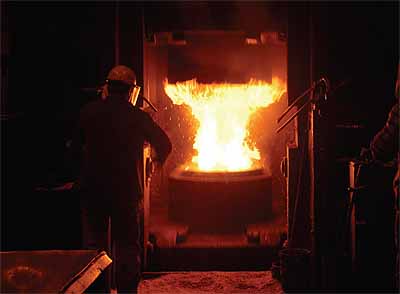Schmiedag
Schmiedag – your technical friend
State-of-the-art forging technologies, with computer-controlled plants and equipment for the manufacture, heat treatment and mechanical processing of forgings, are the trademark of the Schmiedag company.
The business’ high degree of automation, including programme control, automatic handling and the application of industrial robots, guarantees an economical manufacturing process.
Schmiedag’s own stamp and tool shop in Hagen uses specially designed software and CAD/CAM systems prior to production. From construction to machine programme steering, efficient IT equipment continuously monitors the dimensional accuracy of finished tools. The Hagen plant produces components with individual weights of 500g to 500kg. Whilst heavier components can be manufactured by the organisation’s sister company, Wildauer Schmiedewerke at its facility in Wildau near Berlin. In addition to this, the business also has a cutting centre and friction welding in Homburg.
Wildauer Schmiedeweke is one of the leading die-forging shops in Europe for large forged parts. The two companies operate in a number of different markets, including automotive, shipbuilding, mechanical engineering, military, railway, energy and oil and gas.
Dr Alexis Bömcke, technical managing director for Schmiedag comments: “We specialise in the production of die-forging parts of all sizes. For example, we are one of the leading producers of con-rods worldwide. We can manufacture small con-rods for cars or large ones for big engines in power plants. We can also produce, amongst other products, crankshafts, brake discs, axles, camshafts and pumps.”
In 1999, Schmiedag was acquired by the Georgsmarienhütte Group and as a result, Wildauer Schmiedewerke, having already joined the parent organisation in 1997, became its sister company. Today, these two businesses work side-by-side designing and developing die-forging parts of various sizes. The Georgsmarienhütte Group represents 51 medium-sized companies in Germany and Austria. As diverse as these businesses are in their different markets, they all have the same goal: to find constantly new fields of application for steel, iron and aluminium materials, and to use these materials to the benefit of their customers.
Looking at the main benefits of being part of the Georgsmarienhütte holding company, Alexis comments: “The parent Group has been very supportive of our organisation and, unlike former owners of Schmiedag, it has helped us to invest our profits back into the business. Therefore, we have been able to acquire new machinery and upgrade existing equipment. Although these investments have been wholly funded by ourselves, Georgsmarienhütte has given us the support to develop the company.”
Through this support, both Schmiedag and Wildauer have grown to become leading players in the die-forging industry. Today, the companies operate on a worldwide basis, with approximately 50 per cent of products being exported to areas such as Europe, the Far East, the US and Russia. Alexis explains: “As we can produce both small and extremely large forging parts with a maximum weight of 3.5 metric tonnes, we are able to operate in a number of different markets around the world. Our production facilities are based on what we call a ‘vertical line’, which means we can develop products of any size.”
Both Schmiedag and Wildauer work extremely closely with their clients to ensure they are meeting exact requirements. As a result, when issues or challenges are faced they can be quickly resolved through the strong customer relationships the companies have built up. Alexis looks at a specific example: “The main challenge we continually face is technical issues. For example, we are currently manufacturing brake discs for high-speed trains. This requires a very difficult forging process, as we have to ensure that the material used is both dense and pure. As a result, the discs are produced to the highest standards for use on high-speed applications.”
Aside from the development of specialised forged parts, the two companies place a strong emphasis on providing an excellent technical service. This can be seen from Wildauer’s website, as it states: “We are more than a mere supplier to our customers. We are your partner. We also benefit from the commitment and qualifications of our employees, who ensure customer-orientated solutions.”
Alexis adds: “One of the main factors that sets us apart from the competition is our highly experienced and knowledgeable workforce. In both Schmiedag and Wildauer, the employees are very intellectual and have a high level of technical expertise. As a result, we have a good team atmosphere, which is extremely flexible and can meet almost any customer requirement.”
Furthermore, the Schmiedag and Wildauer companies understand that their clients are not experts in the provision of forging, therefore, they act as experts for their customers and develop solutions, which meet and exceed their needs. This service has recently been recognised by clients in the US. Alexis explains: “We have recently received extremely positive feedback from the US and our customers there have identified our extensive technical knowledge in the forging process.”
He concludes: “Looking to the future, our strategy for the next ten years is to increase our value-added offering, which means our clients will not only be able to order forging parts but we want to further focus on their ability to order finished machine parts and assembly services. In addition, we will continue to carefully monitor the market place to identify new forging technologies – this will help us to stay ahead of increasing competition from the Far East.”
Schmiedag
Products: Die-forging parts
Sites: Hagen, Homburg & Wildau in Germany
Employees: 500
www.schmiedag.de
